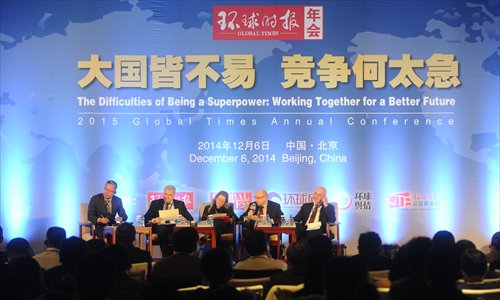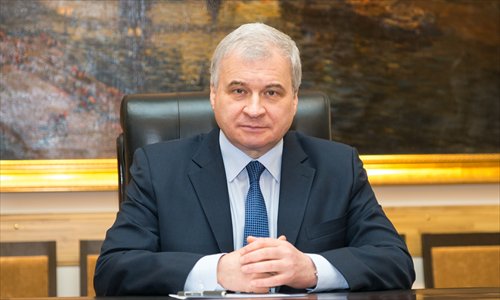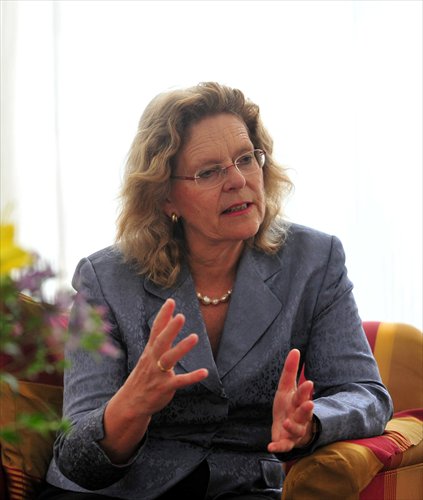Ambassadors see Chinese initiative as source of future growth

Guests listen to the discussion during the Ambassador's Forum at the Global Times' Annual Conference in Beijing, on Saturday. Photo: Li Hao/GT
Editor's note: The Global Times' Annual Conference was held on Saturday. As part of the conference, an Ambassador's Forum was held, during which the ambassadors from Poland, Russia, Israel and Austria expressed their views on how the New Silk Road, both on land and on sea, has influenced their countries.

Tadeusz Chomicki, Poland's ambassador to China
Tadeusz Chomicki, Poland's ambassador to China
We believe that the New Silk Road will strengthen economic cooperation between Europe and Asia, creating new business opportunities and benefiting all countries participating in this project.
The Silk Road links two globally crucial hubs of economic activity, with a combined share of more than 40 percent of the world economy. It's an ambitious project and is not going to be easy to implement. All counties along the road need to work together.
Poland is on the natural crossroads of trade and transportation routes linking eastern and western, northern and southern Europe. This advantage makes Poland uniquely equipped to serve as the major hub on the western end of the New Silk Road.
Poland is also enjoying very successful economic development, making it a perfect country for investment. Poland is among the pioneers of overland transportation links between East Asia and Europe, which will become the backbone of the New Silk Road. The Chengdu-Lodz rail link was a breakthrough in economic relations between Poland and China, and the Suzhou-Warsaw line followed.
Poland is also playing an increasingly important role in maritime transportation links between China and Europe. There's a regular container line that links Shanghai and Gdansk, and Gdansk has excellent transportation links to the whole Baltic Sea region, central and eastern Europe.
We hope the geographical position of Poland can be a good advantage for us in bridging the trade between China and Europe. We hope most of the products going from Europe to China can pass through Poland.

Andrey Denisov, Russia's ambassador to China
Andrey Denisov, Russia's ambassador to China
During its presidency of the Shanghai Cooperation Organization (SCO), Russia is committed to contributing to the future development of the Silk Road Economic Belt initiative, particularly in its statements in the 2025 SCO Development Strategy.
It is clear that long-term development can be accomplished only with peace and stability in central Asia, and at the same time we all are aware of the risks and challenges in this region and its neighborhood. The Russian initiative to upgrade the SCO Regional Antiterrorist Structure into a universal center for combating security threats and challenges should be seen in the context of enhancing security within this region. As the first step, we propose to expand the responsibilities of the SCO Regional Antiterrorist Structure by adding an anti-drug component. It is of great importance, especially in the context of the need to combat terrorism financing.
With regard to the trans-Eurasian nature of the Silk Road Economic Belt initiative, Russia welcomes China's proposal to build transport corridors between Europe and Asia. For Russia the key goal is to reveal the potential of the Baikal-Amur and Trans-Siberian Railways, which could help advance economic and social development of Russia's Eastern Siberia and Far East regions.
Large-scale infrastructure development requires adequate financing. We have a positive view of Chinese moves to establish the Asian Infrastructure Investment Bank and the Silk Road Fund, and at the same time we believe it is important to speed up efforts to establish the SCO's own financial institutions, which will promote greater cooperation within the organization.

Matan Vilnai, Israel's ambassador to China
Matan Vilnai, Israel's ambassador to China
The State of Israel supports President Xi's New Silk Road Initiative and hopes to play a constructive role in reviving the ancient route. The ancient Silk Road passed through the Middle Eastern region, bringing together people, culture and goods, and today's Middle East has much to gain from this initiative.
The two civilizations - the Chinese and the Jewish, developed in parallel but separately in an age of limited connectivity, and yet we have many things in common, like family values, and the appreciation for education. The New Silk Road, like the ancient one, aims to connect, and this connectivity will hopefully bring with it peaceful economic development.
The [New] Silk Road presents yet another opportunity for China and Israel to enhance economic cooperation. The past year and a half have seen positive momentum in bilateral cooperation and in the establishment of frameworks meant to boost economic cooperation between the two countries, and the State of Israel remains committed to realizing the plan.

Irene Giner-Reichl, Austria's ambassador to China
Irene Giner-Reichl, Austria's ambassador to China
We are a landlocked country and don't have access to any sea ports. So we are very much interested in excellent infrastructure and good access to trade projects. We are also, as many other European countries, dependent on energy imports, and the roots for those energy imports by large come from the east, such as Russia, Ukraine and Turkey. So the overall concept of the terrestrial Silk Road initiative is interesting to a country like Austria. It's also important to establish a good interface between west and central Europe.
I also want to talk about the Maritime Silk Road. Our interests in Africa are defined by the proximity of the African continent to Europe, to establish cooperation for development and resources. This interest is shared by other countries in Europe as well.
It's important for us to see good, mutual understanding and the exchange of history, experience between Europe and China, but bringing distant countries closer together may also bring difficulties, such as organized crime, human trafficking, drugs, something all countries have to confront. The initiatives could be a good opportunity to enhance cooperation on custom issues, justice, rule of law, so that the we can transport what we want, but not what we don't want, and increase the security of our people.
Q&A session
GT: As the two regions become closer economically and the outside political atmosphere changes, will there be a more urgent need for Russia to establish closer economic relationship with China?
Andrey Denisov: China as a partner is very important to us. Our relationship as close neighbors will not change because the ups and downs of international relations. Sixty-five years ago, the Soviet Union was the first country to recognize China as an independent country, in 1949. This year the trade volume between the two countries reached 900 billion US dollars, but it's still far behind our possibilities and our needs, so there's still a lot of work to be done in order to establish the material basis of our relations. China is our neighbor, a civilization; we hope our exchanges will be people to people, young people to young people, including young journalists.
GT: Most people know Austria for its music, food and history, but not its industry. Can you talk about where China and Austria can have closer cooperation? What can Chinese businessmen or companies do in Austria?
Irene Giner-Reichl: Many Austrian companies are in China doing good business, especially in the high-end technology sector, specialized machinery in particular. We also have good companies in environmental technology, especially on environmental issues brought by urbanization. The Chinese market is important for Austria and its companies.
In Austria, we have Chinese businessmen in the dairy sector. We also have cooperation in machinery manufacture. Also, I think the location of Austria in the center of Europe is an advantage for many companies. They choose to invest in Austria then they are investing in the European Union, which is a good opportunity for them.
GT: Do you think Poland and China are at similar industrial stages, and as a result, the trade volume between the two countries isn't great? Also, there doesn't seem to be many people who visit Poland for tourism reasons.
Tadeusz Chomicki: When I came to China five years ago, my biggest problem was how little Chinese people know of Poland. But if we can't change that picture, we can't move things forward. China is our prime focus. In the past five years we've seen a lot of effort, opportunity and potential. The government institutions are paying more attention to Poland, and were followed by the business community, and on both sides. We have lots of Chinese investors, but I think we can have something bigger.
GT: Right now Israel is cooperating with China in the technology and agriculture sector. Will the Silk Road Economic Belt bring the two countries closer?
Matan Vilnai: Even though we established diplomatic relationship with China in 1949, the real development of relationship wasn't until 1992. During these 20 years, the trade volume between the two countries rose from 50 million to 10 billion dollars and it's still on the rise. The rise of that number represents the closing of relationship. I found China and Israel are similar, in that we have the same hard-working and smart people. Therefore I think the relationship will only get better and better.
Newspaper headline: Top diplomats talk New Silk Road